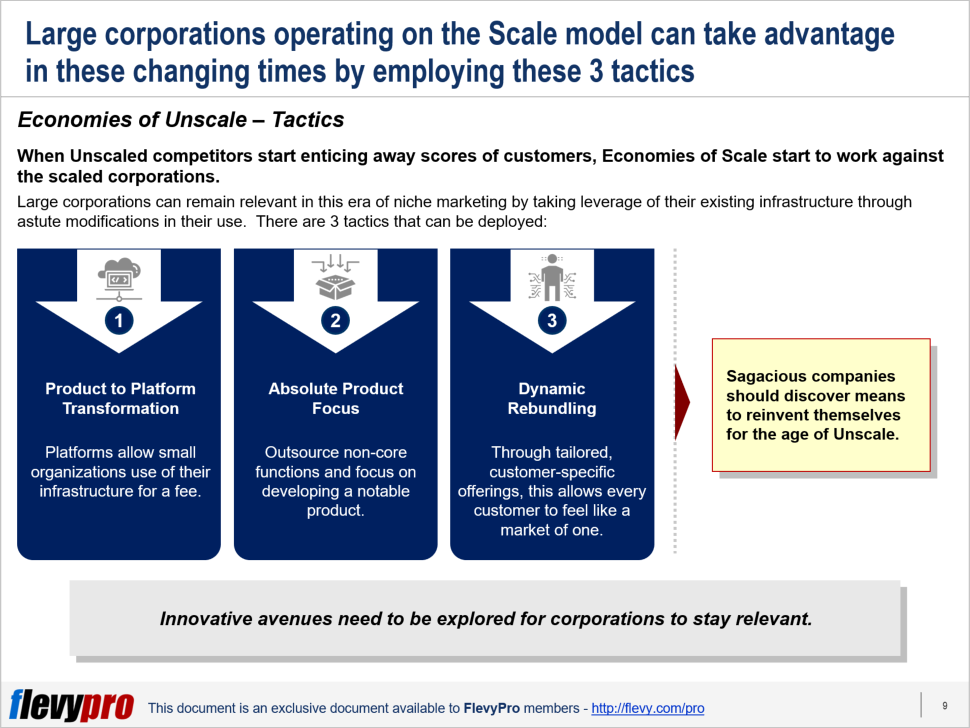Editor's Note: Take a look at our featured best practice, Pricing Strategy (38-slide PowerPoint presentation). Pricing Strategy is a core pillar of Marketing and Product Strategy. It is 1 of the 4 Ps of Marketing (also known as the Marketing Mix - Product, Price, Placement, and Promotion). As such, knowing how to properly price your product is extremely important to the commercial success and viability of [read more]
Also, if you are interested in becoming an expert on Strategy Development, take a look at Flevy's Strategy Development Frameworks offering here. This is a curated collection of best practice frameworks based on the thought leadership of leading consulting firms, academics, and recognized subject matter experts. By learning and applying these concepts, you can you stay ahead of the curve. Full details here.
* * * *
 Futuristic, technology-driven business models are weakening the conventional advantages of Economies of Scale. Large corporations, founded on Scale, nevertheless have areas that they can exploit if they reposition rapidly.
Futuristic, technology-driven business models are weakening the conventional advantages of Economies of Scale. Large corporations, founded on Scale, nevertheless have areas that they can exploit if they reposition rapidly.
For the best part of over a century, Economies of Scale—Cost Advantages that businesses achieve owing to their scale of operation—fashioned the corporation into a perfect engine of business. The economic concept of Economies of Scale was first floated in the Adam Smith era where the idea of obtaining larger production returns through the use of division of labor was introduced.
A technological rush, distinct in history, was observed near the beginning of the 20th century. These new technologies were accompanied by scale i.e., bulk production and access to huge markets. The Economies of Scale guided business success—the strong inverse relationship connecting fixed costs and output grew into a basis of Competitive Advantage.
Back then, investments in scale was the most sensible proposition. Not only did it lower fixed costs but also created a formidable barrier for competitors, denying them entry in the market. Every type of business spent the 20th century in the quest for scale.
The advent of game-changing new technologies such as mobile devices, social media, and cloud computing, augmented by Artificial Intelligence (AI), is whirling Economies of Scale into Economies of Unscale.
Specifically, rise of Software as a Service (SaaS) and emergence of Product to Platform Transformations—coupled with AI’s ability to customize—overthrows bulk production and mass marketing as a basis of Competitive Advantage. These progressions have battered the powerful inverse correlation between fixed costs and output that delineated Economies of Scale.
Today, minor, unscaled businesses, leveraging Platform Scaling Strategies while renting SaaS, can hunt in niche markets, effectively contesting big companies that are strained by decades of investment in scale, i.e., in large-scale production, distribution, and marketing.
The triumphant companies in the current tech rush—enabled by Platforms and SaaS—are the ones led by Customer-centric Design, providing each customer precisely what they want, that too while making a profit, and not companies offering everyone uniform products.
Large corporations can remain relevant in this era of niche marketing by taking leverage of their existing infrastructure through astute modifications in their use. They can deploy 3 key tactics to accomplish this:
- Product to Platform Transformation
- Absolute Product Focus
- Dynamic Rebundling

Let us delve a little deeper into the details of the 3 tactics for leveraging Economies of Unscale.
Product to Platform Transformation
Dynamic corporations have expended decades building scale which is extremely specialized for their industry. Efficient factories, distribution channels, retail outlets, supply chains, marketing expertise, and global partnerships have been painstakingly developed. It is time for these corporations to take a decision on whether it is more viable to rent out this capability to other companies or not.
An example of such an approach is that of P&G’s Connect + Develop program that has been running for more than a decade.
Absolute Product Focus
As corporations become bigger, emphasis on control becomes more pronounced—processes, regulations, stock prices, and a variety of non-core issues take precedence over great product offering. Niche market focus blurs and attempts are made to make a product that may appeal to the masses in an effort to create Economies of Scale.
In this age of Unscale, the product/customer-focused competitor preys on such weakness. Large corporations can mitigate the repercussion of such weakness by organizing as a network of small businesses focusing on core function while outsourcing non-core functions. Each business, completely dedicated to creating a product perfect for its part of the market.
Apple Inc. contracts out manufacturing to Chinese companies while keeping the R&D and innovation—its core function—in the U.S.
Dynamic Rebundling
Successful companies in this day and age of Unscale are the ones that make every customer feel like a market of one. A corporation—a compendium of products—can match this by initially understanding its customer, then bundling its products as per each customer’s needs.
A great example is The Honest Co., which in 2012, began selling specialized line of diapers and wipes by subscription. First year, the company raked in $10 million in revenue by supplying a niche customer, a niche product, dissimilar to mass-market brands. By 2016 it was making sales exceeding $300 million.
Interested in learning more about the 3 tactics for leveraging Economies of Unscale and how corporations have, in their own way, taken advantage? You can download an editable PowerPoint on Economies of Unscale here on the Flevy documents marketplace.
Do You Find Value in This Framework?
You can download in-depth presentations on this and hundreds of similar business frameworks from the FlevyPro Library. FlevyPro is trusted and utilized by 1000s of management consultants and corporate executives. Here’s what some have to say:
“My FlevyPro subscription provides me with the most popular frameworks and decks in demand in today’s market. They not only augment my existing consulting and coaching offerings and delivery, but also keep me abreast of the latest trends, inspire new products and service offerings for my practice, and educate me in a fraction of the time and money of other solutions. I strongly recommend FlevyPro to any consultant serious about success.”
– Bill Branson, Founder at Strategic Business Architects
“As a niche strategic consulting firm, Flevy and FlevyPro frameworks and documents are an on-going reference to help us structure our findings and recommendations to our clients as well as improve their clarity, strength, and visual power. For us, it is an invaluable resource to increase our impact and value.”
– David Coloma, Consulting Area Manager at Cynertia Consulting
“FlevyPro has been a brilliant resource for me, as an independent growth consultant, to access a vast knowledge bank of presentations to support my work with clients. In terms of RoI, the value I received from the very first presentation I downloaded paid for my subscription many times over! The quality of the decks available allows me to punch way above my weight – it’s like having the resources of a Big 4 consultancy at your fingertips at a microscopic fraction of the overhead.”
– Roderick Cameron, Founding Partner at SGFE Ltd
Want to Achieve Excellence in Strategy Development?
Gain the knowledge and develop the expertise to become an expert in Strategy Development. Our frameworks are based on the thought leadership of leading consulting firms, academics, and recognized subject matter experts. Click here for full details.
"Strategy without Tactics is the slowest route to victory. Tactics without Strategy is the noise before defeat." - Sun Tzu
For effective Strategy Development and Strategic Planning, we must master both Strategy and Tactics. Our frameworks cover all phases of Strategy, from Strategy Design and Formulation to Strategy Deployment and Execution; as well as all levels of Strategy, from Corporate Strategy to Business Strategy to "Tactical" Strategy. Many of these methodologies are authored by global strategy consulting firms and have been successfully implemented at their Fortune 100 client organizations.
These frameworks include Porter's Five Forces, BCG Growth-Share Matrix, Greiner's Growth Model, Capabilities-driven Strategy (CDS), Business Model Innovation (BMI), Value Chain Analysis (VCA), Endgame Niche Strategies, Value Patterns, Integrated Strategy Model for Value Creation, Scenario Planning, to name a few.
Learn about our Strategy Development Best Practice Frameworks here.
Readers of This Article Are Interested in These Resources

46-slide PowerPoint presentation
Some innovations are truly spectacular, but consumers are slow or just refuse to adopt. In fact, over 70% of all new products fail in the marketplace--and innovative, new products fail at an even higher rate.
Why is this the case? And, how do companies overcome this?
This document discusses
[read more]

29-slide PowerPoint presentation
This document discusses Rogers' Five Factors, framework for analyzing and understanding the diffusion and adoption of product innovations.
Businesses are interested in understanding how innovations diffuse, so that they can better predict and manage this consumer adoption. A popular framework
[read more]

63-slide PowerPoint presentation
This toolkit is focused on the point at which we actually ask the customer for a price increase. None of the strategic value of a pricing recommendation matters unless we take action with the customer. There are several tools and approaches that could make the increase more successful.
This
[read more]

62-slide PowerPoint presentation
This presentation is a training document on how to determine the true profitability of a product line. Unlike the traditional accounting, this approach assigns costs to products based on relevant cost drivers that can help management make meaningful decisions about product lines.
The deck has 60
[read more]
 Futuristic, technology-driven business models are weakening the conventional advantages of Economies of Scale. Large corporations, founded on Scale, nevertheless have areas that they can exploit if they reposition rapidly.
Futuristic, technology-driven business models are weakening the conventional advantages of Economies of Scale. Large corporations, founded on Scale, nevertheless have areas that they can exploit if they reposition rapidly.




